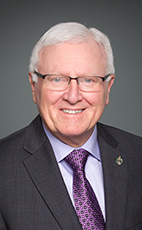Mr. Speaker, I rise with a follow-up to my question earlier about the 911 communications system in Nova Scotia.
Currently, as members know, there are two main facilities in Nova Scotia that deal with 93% of all ambulance, fire, and police emergency calls, dispatching the RCMP and so on. One of these facilities is in Truro and the other is in Dartmouth. They are an hour apart, which provides for redundancy. In the event that something happens in Dartmouth, then the Truro office can pick up the load, and if something happens in Truro, the Dartmouth office can pick up the load, which is providing that necessary redundancy.
Recently, the RCMP has suggested it may close the Truro office and move it to Dartmouth where the other police communications centre is located. I was concerned at first because of the jobs, but lately I have become aware that it is a safety issue as well.
Through access to information, I was able to access a report that the RCMP did, which states, “It is not recommended that the two largest police communications operations in Nova Scotia be placed within the same metropolitan area.” That is exactly what the RCMP is proposing to do.
The RCMP report goes on to say, in recommendation number three, that the RCMP “not locate their primary OCC within the Halifax Regional Municipality.” Again, that is exactly what it is proposing to do.
The same report goes on to say that the primary service delivery site should “be outside of HRM due to risks of placing two largest police communications centres in proximity tp each other.”
This is about redundancy. Therefore, there should be a separation between the two centres so that, in the event something happens in Dartmouth, Truro could pick up the load and vice versa.
I went a little further because I needed to know more about this. I did not want to say anything that was not accurate. Therefore, I contacted one of the major police forces in Canada and I asked what it used as a manual for emergency measures. It referred me to the Homeland Security manual that it uses. This police force serves seven million people. This is from the Federal Emergency Management Agency, or FEMA. It confirms exactly what the RCMP report said. It states, “Organizations should have adequate, separate locations to ensure execution of their functions.”
That same police force also provided me with another report from the National Emergency Number Association. These are reports that this police force and most police forces in Canada use to set up their emergency measures program. The report says that the document is prepared solely for the use of 911 system service providers. It states, “It is desirable to have at least two layers of redundancy for each major component of...[an emergency services office].”
Here we have three reports saying that to consolidate these emergency measures communications centres into one municipality puts Nova Scotians at risk. In fact, in this case, they would both be located in Dartmouth if the RCMP goes ahead with this. The decision has not been made yet. Hopefully, it will not make that decision, because this is the opposite of what everybody else is doing. It is reverse redundancy. Most places are going for redundancy and trying to make sure they have separate locations for their communications. If the RCMP does this it would be reverse redundancy and will put Nova Scotians at risk. The word “risk” is in the RCMP report.
Therefore, my question is this. If the RCMP decides to contravene and contradict its own recommendations, who would be held responsible in the event of a disaster when life and limb are lost?

